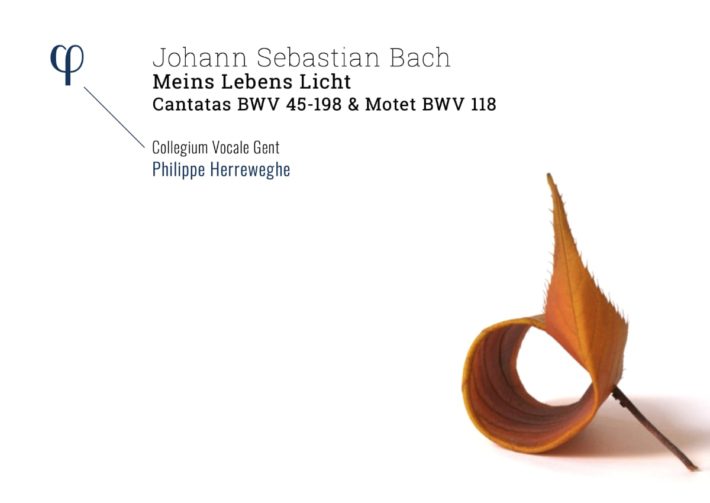Any new release of Bach performed by Herreweghe and his forces is cause for celebration. Their recordings of Bach’s music over the last 40 years have been consistently impressive, thoughtful, and beautifully performed, adjectives easily applicable to this new release.
The program opens with “Es ist dir Gesagt, Mensch” (Cantata 45), written for the eight Sunday after Trinity in 1726. Its opening chorus is remarkable, the entire musical argument developed from the opening theme. The choir (consisting of 16 singers/4 to a part) performs with admirable agility, clear diction, and impressive balance. The orchestral sound is colorful but refined, and the movement has a lilting buoyancy suggestive of the joy one feels when we “behave justly, love mercy, and walk humbly with God.”
Herreweghe’s soloists are uniformly excellent (as are the soloists in the recordings led by Suzuki and Gardiner). Tenor Thomas Hobbs and Alto Alex Potter sing with enviable evenness of tone and emotional conviction. Peter Kooij comes up against his slightly younger self in “Es warden viele zu mir” (Tr. 4 – he also sings this same cantata in Suzuki’s recording). Here he seems to more fully convey the text’s judgment of those who follow false prophets, perhaps because Herreweghe chooses a slightly slower tempo. The following alto aria, “Wer Gott bekennt,” is ravishing, its delicate flute arabesques dialoguing with the alto. Herreweghe’s organ continuo (versus Suzuki’s harpsichord) also contributes to a warmer orchestral accompaniment.
Related Classical Music Reviews
- Review: Bach – Johannes Passion – Herreweghe (2020)
- Review: Bach – “Soli Deo Gloria” – Cantatas 21,76 – Collegium Vocale Gent, Pierlot
- Review: “Kantaten” – Vox Luminis, Lionel Meunier
Bach describes “O Jesu Christ, mein’s Lebens licht” as a motet on the two surviving manuscripts, yet many scholars believe it to be a fragment from a lost early cantata. Whatever its original purpose, this deeply affecting music fully conveys the comfort and hope a believer feels when facing death. Herreweghe’s reading is surprisingly fast, taking 8’04”, whereas Suzuki takes 9’19” and Gardiner’s first performance (currently available on the Erato label) lasts a little over ten minutes. On first hearing Herreweghe’s tempo seemed to minimize any funereal atmosphere, but the singing and playing has a beguiling beauty and delicacy that, along with the quicker tempo, is perhaps meant to suggest the Christian’s confidence in spending eternity in heaven. It quickly became a fully convincing interpretation.
This is Herreweghe’s second recording of the Trauer Ode (BWV 198). The first, released by Harmonia Mundi in 1988, featured finesse and technical precision in a recording that really captured the mournful timbre of the recorders and viola da gambas. This new performance is even finer, and Herreweghe has a surer grasp on the work’s somewhat sprawling structure. He also discovers more fragility in the writing. Kooij was part of the Harmonia Mundi performance, and if his voice sounds fresher and nimbler in that recording, there is ample compensation in the greater depth and textual expression of this new reading. It also features Dorothee Mields, one of today’s most accomplished Bach performers, and her singing eclipses the contribution of Ingrid Schmithüsen on the earlier recording.
No one interpretation can capture every theological and musical nuance of Bach’s choral works. Some of his cantatas, especially those written for the important liturgical festivals, really respond to Gardiner’s high energy and extroverted virtuosity. One turns to Suzuki to hear an interpreter intent on revealing the theological import of each work. Herreweghe’s sophisticated and subtle interpretational approach serves each of the works on this new album well, and the recorded sound is better than what the Gardiner recording and equal (if perhaps more intimate) to Suzuki’s BIS recording. Liner notes are short, but well written, with print large enough that one can read without resorting to a magnifying glass. Thankfully, full translations are provided. The total timing (58’35”) is ungenerous, especially when there are those of us hoping for a complete cantatas cycle from Herreweghe someday. Nevertheless, the quality of the performances and engineered sound make this an easy recommendation.

Bach – Cantatas and Motet
Es ist dir gesagt, Mensch, was gut ist, Cantata BWV 45
O Jesu Christ, mein’s Lebens Licht, Motet BWV 118
Laß, Fürstin, laß noch einen Strahl, Trauerode BWV 198
Dorothee Mields – Soprano
Alex Potter – Alto
Thomas Hobbs – Tenor
Peter Kooij – Bass
Collegium Vocale Gent
Philippe Herreweghe – Conductor
PHI / Outhere Music, CD LPH 035
Recommended Comparisons
Read more classical music reviews or visit The Classic Review Amazon store











